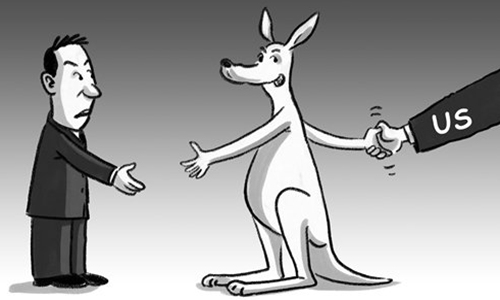Are xenophobia, McCarthyism running deeper in Australia?
By Wang Wenwen Source:Global Times Published: 2020/6/27 21:49:00

Illustration: Liu Rui/GT
Queensland Police has launched an investigation into Xu Jie, the Chinese consul-general in Brisbane, for allegedly inciting violent threats against an Australian university student, Australian media reported on Thursday. The student last year held a protest to support secessionist movements in Hong Kong, criticized China's Xinjiang policy and spoke against alleged Chinese influence on Australian campuses. The Consulate-General of China in Brisbane then issued a statement condemning "separatists," hence the student's accusation against Xu.
The offensive against the top Chinese diplomat is the Australian authorities' latest attempt to further strain the already tense relationship between China and Australia, even if the student was barred from his studies at the University of Queensland until 2022, which followed allegations of his misconduct, included unorthodox tactics and combative comments on social media.
The Australian authorities' mentality toward China has been increasingly dictated by the competition between China and the US, and Canberra could not resist joining Washington's chariot. On Friday, the Australian authorities raided the home and office of a Labor politician for his alleged role in the Chinese government's "plot" to manipulate Australian politics and policy. This state lawmaker was forced to resign in April as assistant president of the NSW Legislative Council due to his praise of China's coronavirus responses, which ran against the Australian government's staunch criticism of China and its call for a global inquiry into the outbreak's origins.
China-Australia relations have been rocky in the past couple of years. Australian politicians and media have not only verbally attacked China's domestic and foreign policies, but also ruthlessly hyped Chinese so-called infiltration. They view Chinese Australians and Chinese students as spies, and those who adopt even a mildly friendly approach to China fear speaking out. Especially against the backdrop of the coronavirus pandemic, Australians have continued to find fault with China.
Australia lacks rational diplomatic thinking. The mainstream view in the country is that following US policy against China risks nothing, while it could curry favor from Washington. Allan Behm, the head of the International and Security Affairs Program at The Australia Institute, said recently that Australian politicians' ignorance of China has led to the failure of Australia-China relations. More importantly, he believes Canberra's taking the cue from the confrontation between Washington and Beijing and fitting into the slipstream of Donald Trump and Mike Pompeo have also contributed to the frosty ties.
Australia's China ties have increasingly been decided by signals from the US in the past few years. What makes Australia different is that its xenophobia, discrimination and McCarthyism go even further than those in the US. China is committed to building a mutually beneficial economic relationship with Australia and has never forced Australia to pick sides, while Canberra views anyone connected to the Chinese government as a potential subversive, which is typical McCarthyist thinking.
In 2017, then Australian prime minister Malcolm Turnbull called on the Australian people to "stand up" against Chinese interference. China has never interfered in Australia's diplomatic policy, while Australia has bowed even further to pressure from Washington over the years. If Australian politicians really want their people to stand up, they should fairly assess Canberra's diplomatic weight and make realistic choices.
Posted in: OBSERVER